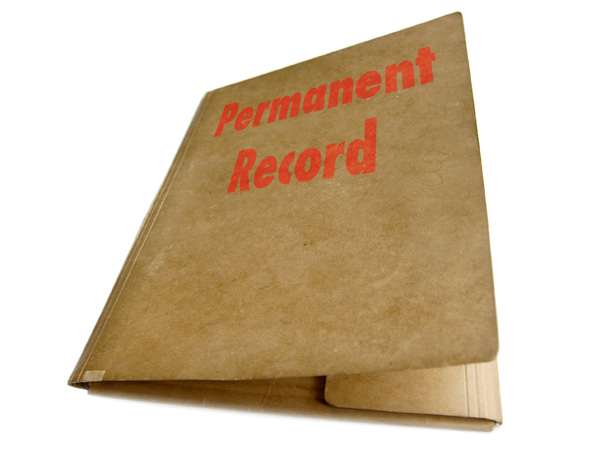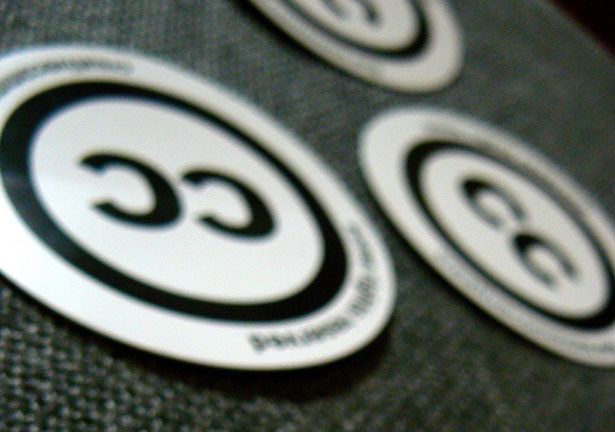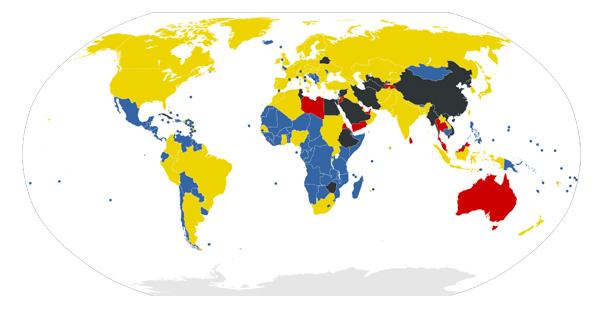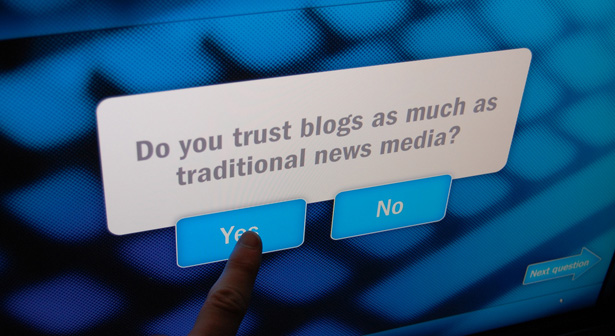Free Speech and Freedom of Information: Advice for Bloggers
 The information bloggers choose to put out there often has a huge impact on how they're perceived and what others online think about them.
The information bloggers choose to put out there often has a huge impact on how they're perceived and what others online think about them.
And what many bloggers don't realize is that information they put on their blogs can have a direct legal impact.
Even if what you're posting to your blog isn't breaking any laws, it may be considered unethical by others, which can often be just as damaging.
Here's a guide to free speech and freedom of information specifically for bloggers. Legal issues, ethical issues, and other things to consider are all covered.
If you have additional input or advice, or disagree with anything here, please speak up in the comments.
Permanent Records
Do you remember the stories about a "permanent record" that were told to frighten children into behaving appropriately throughout school?
The concept was popularized on television and in movies, with kids constantly being threatened that a particular action was going to be placed on their "permanent record".
The theory was that this record would follow you through school and then eventually into the workforce, and that negative things it contained could effect your entire life. In reality (in most countries, at least), there's no such thing as a "permanent record", at least not in the sense that it was portrayed.
But with the Internet, there is a permanent record. Records are kept of virtually everything you do online, often automatically as part of backups and caches, though sometimes it might also be done manually if something particularly funny or embarrassing or incriminating is done.
This permanent record can come back to haunt you in the future, depending on what it contains, and can really interfere with your ability to get a job, get into a good college, or run for political office.
The thing to remember, is that once you put something out there online, it's out there forever. You won't get a do-over if it's something you're no longer proud of.
While for the average person this is unlikely to ever cause any substantial problems, if you're a businessperson or future politician, it can be very damaging.
Consider your aspirations and future ambitions and act accordingly now. Don't put things online that you think you might regret later. Chances are, you probably will regret them at some point.
Libel and Slander
Libel is when you write something untrue and potentially harmful about someone. Slander is when you say something untrue and potentially harmful about someone.
Laws vary from country to country on how slander and libel (collectively called "defamation") is handled.
In some countries (such as the U.S.), defamation is a civil matter and is dealt with only if the victim sues the defamer. In most other countries (including Canada, the UK, Australia, Russia, and China) though, there are criminal laws against defamation, at least in certain circumstances.
For the most part, if something you've said or written is true, and you can prove that it's true, you'll be protected from libel or slander suits.
That doesn't mean that you still won't have to defend against them, which can be expensive. You can still run into issues if the information you've disclosed isn't of public interest.
If the information you've disclosed publically is considered private information and not of public note, then you can be sued under invasion of privacy laws in some cases.
Privacy
Privacy laws are another thing that vary widely from country to country.
As a general rule, though, unless something is of public importance, if it's not something someone would likely want shared, don't share it.
Now, "public importance" is one of those things that's open to a lot of interpretation. Obviously, if you're exposing information about a public figure, then there's a good chance a lot more falls into the "public importance" category.
If it's someone who isn't a public figure, then there are fewer areas that would be important to the general public, and therefore fewer things you can expose without having serious worries about being sued or violating any laws.
A good rule of thumb is that if you wouldn't want someone to expose a particular fact about you, don't expose it about them without a very good reason for doing so.
Intellectual Property
Intellectual property generally includes copyrights, patents, and trademarks.
In the United States and many other countries, as soon as a work (whether written, audio, or another format covered by the law) is created, it is protected by copyright law.
No registration is required to be protected, though registration does add an extra layer of protection (mainly a specific date when it can be proven that a work existed).
Trademarks and patents, however, do have to go through a registration and approval process in order to be protected.
As a blogger or online content creator, you need to respect the intellectual property rights of others. This is usually relatively easy to do. Here are some things to keep in mind when using the work of others within your own blog:
- Don't quote more than a few sentences of someone else's content.
- Properly cite any content you include and link to the original source.
- It's also polite to link to the place where you found content, if it's not the original source.
- Don't use images in your blog posts unless they're licensed for use (through Creative Commons or otherwise) or you have permission.
- When you use images, make sure you link back to the source and properly credit the creator.
- When doing roundups or posts that are showcasing artists' work, it's generally not necessary to ask permission to post small versions of their work with proper credit and links, though you should be prepared to take down the post or the part of the post that features them if they object.
- If you use a trademarked name in your posts, you may want to include a note about who the trademark belongs to and/or link back to the company's website. If you don't, you might even get a letter from the trademark owner requesting that you do so.
An interesting side-note about trademarks: trademarks are always adjectives.
Using a trademark as a verb or even as a noun is technically a violation of trademark law, at least in the United States. In other words, if you say you "Googled" something or you "Photoshopped" something, that's a trademark violation.
The trademarks there are technically the Google search engine, and Adobe Photoshop software.
The problem that companies run into is that if they don't protect their trademarks from use like this, the trademark can become "genericized" and they can lose their trademark rights to it, meaning anyone could then use the name.
Censorship
When we think of Internet censorship, many people generally think of Iran or China and their massive censorship efforts.
But what most people don't realize is that a majority of countries worldwide actually employ some form of Internet censorship or surveillance.
Blue countries have no censorship, yellow countries have some, red countries are under surveillance, and black countries are heavily censored.
Among the countries that employ at least some censorship is the United States, the United Kingdom, Bahrain, Yemen, Australia, Syria, Germany, Denmark, Canada, and Brazil.
These censorship laws are varied, with some specifically set up to protect minors from content that would be illegal for them to see elsewhere, while others aim to block citizens from seeing anything that's considered offensive, immoral, or dangerous by their government.
Many people will agree that some censorship laws are necessary. Laws that protect minors (from things like obscene or pornographic content), for example, are often met with popular support in many countries.
Sometimes these laws only extend to public schools or other government-run institutions, rather than for the populace at large.
Other censorship laws, though, especially those that hinder with freedom of speech, are often met with public disapproval and can cause a country to be ostracized by others in the world community (as is the case with China and Iran).
Censorship plays an important role in what you say online in two separate ways. First, if you live in a country with censorship laws, educate yourself on what those laws permit and do not permit.
Then decide if you can abide by those rules or not. If not, and you're willing to break your country's laws, there are often workarounds possible, such as hosting your site outside of your home country or having someone else register your domain and host your site elsewhere. But realize that you may face legal repercussions by doing this, some of which can be very severe.
The other important role censorship plays in online content is if you're trying to reach people within a particular country.
If your blog's content is of particular interest to those in, say, China, then you'll need to make sure your blog doesn't say anything that violates China's censorship policies.
Web Host Rules
Above we talked about government censorship. But there's another type of censorship that takes place regularly, as well. It's censorship by your web host or ISP.
Hosting companies sometimes have strict rules about what they'll allow to be hosted on their servers and what they won't. The usual targets of these rules are pornography, obscene content, or content that could potentially be used for illegal acts (such as excerpts from books like the Anarchist's Cookbook).
For the most part, these ISP and web host rules aren't something you can fight against. In most of the world, web hosts are private businesses, and have the right to run their businesses in whatever manner they deem appropriate. If they don't want to host a particular type of site, that's their prerogative.
The best advice I can offer in those situations is to find a web host that has no problem hosting the type of material you want to publish.
Censoring Your Own Blog
There's also the question of whether you should censor your own blog.
When visitors leave comments on your posts, you may decide you want to censor them or not post them at all. This is particularly applicable if the comment is offensive or inflammatory, or if it adds nothing to the conversation.
If you do decide to censor comments on your blog, it's generally a good idea to post a public comment moderation policy somewhere. This should outline what types of comments will be excluded from publication (whether this is simply limited to posts that are offensive or extends to those that add nothing to the conversation).
A public comment policy lends credibility and can lead to improved quality in the comments you do receive.
Just realize that some feel that moderating comments in this manner is a hindrance to freedom of speech and may react unfavorably.
You may also censor what you write, in terms of the posts you publish. When you decide not to write about a specific topic due to potential negative reactions and repurcussions, that's self-censorship. Most bloggers self-censor to some extent on a regular basis.
Personal vs. Business Blogging
When considering what information to post on your blog, it's important to consider whether you're blogging for personal or business purposes. What one might consider perfectly appropriate on an informal, personal blog could be offensive or unprofessional if you're blogging for your business.
This is one of those situations where it's important to figure out the repercussions of everything you post online.
If your blog is for your company or for your profession, then you need to consider very carefuly what you post. And not just from a legal standpoint. You need to consider that everything you say is going to reflect on you as a professional.
On a personal blog, people generally expect you to be more informal, more casual, and less professional. But remember that anything you post online may be seen by potential clients or employers in the future. Just because it's a personal site doesn't mean it won't be used against you professionally.
Legal vs. Ethical Issues
When considering what to publish on your blog or elsewhere online, it's a good idea to consider ethical issues as well as legal issues.
There are some things you may debate posting that, while not illegal, may have ethical implications. These include things like off-the-record information shared in confidence or maliciously-obtained information.
While these things may not be specifically illegal, they would definitely be of questionable ethical standards.
One of the main reasons to consider ethical implications is your reputation. If your readers perceive you as unethical, they may also perceive you as untrustworthy and unreliable.
Unethical decisions may also result in problems with others in your industry or niche. They may blacklist your content or your blog entirely, which can really hurt your traffic numbers, especially in niches where blogs tend to quote each other a lot and send traffic back and forth.
When it comes to online content creation, your reputation is often the only thing that matters. And often people aren't given a second chance if they make a blunder.
It's important to consider what the content you're publishing says about you, and that the message it's putting out is the one you want.
Conclusion
For the most part, free speech seems to be the rule rather than the exception in the blogosphere.
Despite censoring, both by bloggers themselves, governments, and ISPs, most blogs are relatively open when it comes to the information they disseminate. This results in a blogosphere that has a diverse array of opinions and voices.
Just remember that everything you put out there becomes a part of the permanent cultural record.
What you say today could come back to haunt you (or help you) five, ten, or even twenty years in the future. Be sure that the message you're putting out there now will be a message you'll be still okay with then.
Written exclusively for WDD by Cameron Chapman.
Disclaimer: I'm not a lawyer, and I've never played one on TV. To that end, the advice below should not be construed as legal advice, simply as sage words from one blogger to another. Also, as laws vary widely from country to country, you should always contact a legal expert in your own jurisdiction if you have any questions.
What are your views on censorship and how it should be handled? Please share your opinion below...























